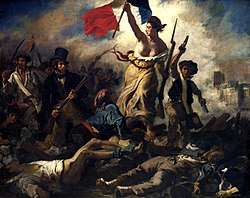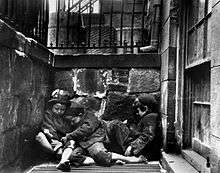
.jpg)


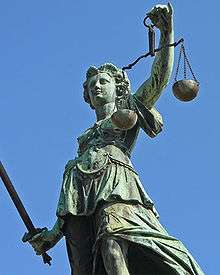
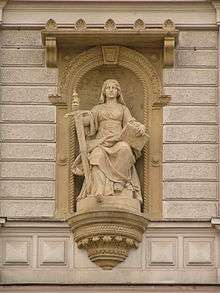
.png)
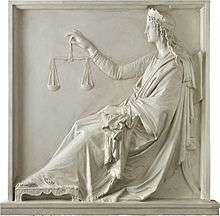


.jpg)
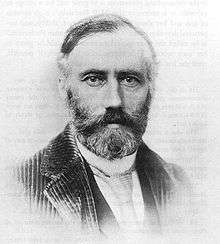
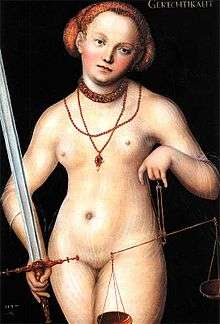

.jpg)
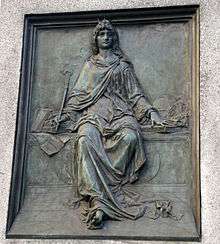
.png)

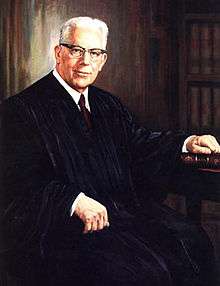
Justice, in its broadest context, includes both the attainment of that which is just and the philosophical discussion of that which is just.
A
- Justice is not a prize tendered to the good-natured, nor is it to be withheld from the ill-bred.
- Charles L. Aarons, Hatch v. Lewinsky et al. (19 April 1945), p. 9.
- The blessings we associate with a life of refinement and culture can be made universal. The good we secure for ourselves is precarious and uncertain until it is secured for all of us and incorporated into our common life.
- Jane Addams, as quoted in The Outlook (January 1952).
- Justice turns the scale, bringing to some learning through suffering.
- Aeschylus, Agamemnon, ln. 250.
- Justice, voiceless, unseen, seeth thee when thou sleepest and when thou goest forth and when thou liest down. Continually doth she attend thee, now aslant thy course, now at a later time.
- Aeschylus, "Fragments", fragment 253; in Aeschylus, trans. Herbert W. Smyth (1926), vol. 2, p. 513. These lines are from a section of doubtful or spurious fragments.
- Liberty, equality — bad principles! The only true principle for humanity is justice; and justice to the feeble becomes necessarily protection or kindness.
- Henri-Frédéric Amiel, undated entry of December 1863 or early 1864, in Amiel's Journal : The Journal Intime of Henri-Frédéric Amiel as translated by Humphry Ward (1893), p. 215.
- Moral excellence comes about as a result of habit. We become just by doing just acts, temperate by doing temperate acts, brave by doing brave acts.
- Aristotle in Nichomachean Ethics (ca. 325 BC) Book II.
- Justice and equity are neither absolutely identical nor generically different. … If they are different, either the just or the equitable is not good; if both are good, they are the same thing. … For equity, while superior to one sort of justice, is itself just … Justice and equity are therefore the same thing, and both are good, though equity is the better.
The source of the difficulty is that equity, though just, is not legal justice, but a rectification of legal justice. The reason for this is that law is always a general statement, yet there are cases which it is not possible to cover in a general statement.- Aristotle in Nichomachean Ethics (ca. 325 BC) Book V.
- I agree that those of us who believe we are pursuing justice must always ask ourselves about our own methods. It also occurs to me that, although we must strive to pursue justice in ways that win over even those who initially disagree with us, we must continue to pursue justice even when we are vilified.
- Arik Ascherman, Pursue Justice Whether You Are Praised, or Vilified (September 6, 2019), The Times of Israel.
- Consequently, if the republic is the weal of the people, and there is no people if it be not associated by a common acknowledgment of right, and if there is no right where there is no justice, then most certainly it follows that there is no republic where there is no justice.
- Augustine, The City of God (c. 413-426), book 19, chapter 21; in The Works of Aurelius Augustine, trans. Marcus Dods (1871), vol. 2, p. 331.
B
- The aim of justice is, as the Romans used to say, to give each his due, and in order for each to be given what is his, it is necessary that it already belong to him; to "give", in this sense, means to protect the right of possession. Each man gets "what belongs to him" in the course of voluntary exchanges that constitute the economic process, and, by virtue of the operation of the market, each receives for his contribution, precisely the amount that will impel him to increase the supply of the most urgently demanded commodities… Only when each man thereby gets what belongs to him, and someone wants to take it away from him, does a question of justice arise.
- Faustino Ballve in "What Economics is Not About" in Essentials of Economics : A Brief Survey of Principles and Policies (1963), as translated by Arthur Goddard.
- 'But whom do I treat unjustly,' you say, 'by keeping what is my own?' Tell me, what is your own? What did you bring into this life? From where did you receive it? It is as if someone were to take the first seat in the theater, then bar everyone else from attending, so that one person alone enjoys what is offered for the benefit of all in common — this is what the rich do. They seize common goods before others have the opportunity, then claim them as their own by right of preemption. For if we all took only what was necessary to satisfy our own needs, giving the rest to those who lack, no one would be rich, no one would be poor, and no one would be in need.
- Basil of Caesarea, I Will Tear Down My Barns, in Saint Basil on Social Justice, edited and translated by C. P. Schroeder (2009), p. 69
- That which is altogether just shalt thou follow, that thou mayest live, and inherit the land which the LORD thy God giveth thee
- Bible (King James Version) Deuteronomy 16:20.
- The path of the righteous one is upright. Because you are upright, You will smooth out the course of the righteous. As we follow the path of your judgments, O Jehovah, Our hope is in you. We long for your name and your memorial. In the night I long for you with my whole being, Yes, my spirit keeps looking for you; For when there are judgments from you for the earth, The inhabitants of the land learn about righteousness.
- Shalt thou reign, because thou closest thyself in cedar? Did not thy father eat and drink, and do judgment and justice, and then it was well with him?
- Bible (King James Version) Jeremiah 22:15.
- What doth the Lord require of thee, but to do justly, and to love mercy, and to walk humbly with thy God?
- The Bible, Micah 6:8.
- JUSTICE, n. A commodity which in a more or less adulterated condition the State sells to the citizen as a reward for his allegiance, taxes and personal service.
- Ambrose Bierce, The Cynic's Dictionary (1906); republished as The Devil's Dictionary (1911).
- Men were singing the praises of Justice.
- “Not so loud,” said an angel; “if you wake her she will put you all to death.”
- Ambrose Bierce, Epigrams, The Collected Works of Ambrose Bierce (1911), Volume 8, p. 372.
- Whenever a separation is made between liberty and justice, neither, in my opinion, is safe.
- Edmund Burke, in a letter to M. de Menonville (October 1789); reported in The Works of the Right Honorable Edmund Burke (1899), vol. 3, p. 438–39.
- Justice is itself the great standing policy of civil society; and any eminent departure from it, under any circumstances, lies under the suspicion of being no policy at all.
- So justice while she winks at crimes,
Stumbles on innocence sometimes.- Samuel Butler, Hudibras, Canto II (1664), Part I, line 1,177.
C
- When the imagination sleeps, words are emptied of their meaning: a deaf population absent-mindedly registers the condemnation of a man. … there is no other solution but to speak out and show the obscenity hidden under the verbal cloak.
- Albert Camus, Reflections on the Guillotine (1957); later included in Resistance, Rebellion, and Death (1960).
- Amongst the sons of men how few are known
Who dare be just to merit not their own.- Charles Churchill, Epistle to George Joseph Harvey and William Hogarth (July 1763), line 1.
- Justitia suum cuique distribuit.
- Justice renders to every one his due.
- Cicero, De Legibus (c. 43 BC), I, 15.
- Justitia nihil exprimit præmii, nihil pretii: per se igitur expetitur.
- Justice extorts no reward, no kind of price: she is sought, therefore, for her own sake.
- Cicero, De Legibus (c. 43 BC), I, 18.
- Meminerimus etiam adversus infimos justitiam esse servandam.
- Let us remember that justice must be observed even to the lowest.
- Cicero, De Natura Deorum (45 BC), III. 15.
- Summum jus, summa injuria.
- Extreme justice is extreme injustice.
- Cicero, De Officiis (44 BC), I. 10. Also in De Republica. V, Chapter III. Same idea in Aristotle—Ethics. V. 14. Terence—Heauton timorumenos, Act IV, scene 5. 48. Columella—De Re Rustica, Book I, Chapter VII. (Ed. Bipont, 1787.) Racine—La Thébaide, Act IV, scene 3. Les Frères Ennemis, IV. 3.
- Fundamenta justitiæ sunt, ut ne cui noceatur, deinde ut communi utilitati serviatur.
- The foundations of justice are that no one shall suffer wrong; then, that the public good be promoted.
- Cicero, De Officiis (44 BC), I. 10.
- If there has been any crime, it must be prosecuted. If there has been any property of the United States illegally transferred or leased, it must be recovered…. I propose to employ special counsel of high rank drawn from both political parties to bring such actions for the enforcement of the law. Counsel will be instructed to prosecute these cases in the courts so that if there is any guilt it will be punished; if there is any civil liability it will be enforced; if there is any fraud it will be revealed; and if there are any contracts which are illegal they will be canceled. Every law will be enforced. And every right of the people and the Government will be protected.
- Calvin Coolidge, statement on the Teapot Dome scandal, The New York Times (January 27, 1924), p. 1. Quoted by Senator Edward Martin, address to the Mifflin County Republican Committee, Lewistown, Pennsylvania (January 25, 1952), Congressional Record (January 28, 1952), vol. 98, Appendix, p. A400.
- Only one thing will create peace and the end of terrorism — the creation of a just world. If there is no justice, there will never be peace. If there is no justice, there is no hope for any of us... There is only one way to establish justice and that is to share the resources of the world more equitably. It is so simple and yet we refrain from doing it. Without sharing there will never be justice. Without justice there will never be peace. Without peace there is no future for us.
- Events shortly to occur will redistribute the power of governments and emancipate the people. The sham democracy of today will give way to true participation, and open a new chapter in man’s long quest for justice and freedom.
- Benjamin Creme in The One who knocks, Share International magazine (July 2016)
D
- Cima di giudizio non s'avvalla.
- Justice does not descend from its pinnacle.
- Dante Alighieri, Purgatorio (1321), VI. 37.
- There is no such thing as justice — in or out of court.
- Clarence Darrow Interview in Chicago (April 1936)
- In a universe of blind physical forces and genetic replication, some people are going to get hurt, other people are going to get lucky, and you won’t find any rhyme or reason in it, nor any justice.
- Richard Dawkins, cited in Awake! magazine 2004, 6/22.
- Now my friends, I am opposed to the system of society in which we live today, not because I lack the natural equipment to do for myself, but because I am not satisfied to make myself comfortable knowing that there are thousands of my fellow men who suffer for the barest necessities of life. We were taught under the old ethic that man's business on this earth was to look out for himself. That was the ethic of the jungle; the ethic of the wild beast. Take care of yourself, no matter what may become of your fellow man. Thousands of years ago the question was asked: "Am I my brother's keeper?" That question has never yet been answered in a way that is satisfactory to civilized society.
Yes, I am my brother's keeper. I am under a moral obligation to him that is inspired, not by any maudlin sentimentality, but by the higher duty I owe to myself. What would you think of me if I were capable of seating myself at a table and gorging myself with food and saw about me the children of my fellow beings starving to death?
- Sir, I say that justice is truth in action.
- Benjamin Disraeli, "Agricultural Distress", speech in the House of Commons (February 11, 1851); in T. E. Kebbel, ed., Selected Speeches of the Late Right Honourable Earl of Beaconsfield (1882), vol. 1, p. 321.
- Where justice is denied, where poverty is enforced, where ignorance prevails, and where any one class is made to feel that society is an organized conspiracy to oppress, rob and degrade them, neither persons nor property will be safe.
- Frederick Douglass Speech on the twenty-fourth anniversary of Emancipation in the District of Columbia, Washington, D.C. (April 1886).
E
- Because the sentence against an evil deed is not promptly executed, the human heart is filled with the desire to commit evil—
because the sinner does evil a hundred times and survives. Though indeed I know that it shall be well with those who fear God, for their reverence toward him; and that it shall not be well with the wicked, who shall not prolong their shadowy days, for their lack of reverence toward God. This is a vanity that occurs on earth: there are those who are just but are treated as though they had done evil, and those who are wicked but are treated as though they had done justly. This, too, I say is vanity.
- Ecclesiastes Chapter 8 Verses 11-14 (New American Bible, Revised Edition)
F
- A just city should favour justice and the just, hate tyranny and injustice, and give them both their just deserts.
- al-Farabi, quoted and translated by Gibb, H. et al. (eds.) (1991) 'Mazalim' in The Dictionary of Islam vol. IV Leiden: Brill.
- The wheels of justice turn slowly, but grind exceedingly fine.
- Variation on a traditional proverb, appeared in various forms over the millennia. Traditionally refers to gods or (later) Christian God rather than justice. Early recorded form of sentiment by Euripides circa 405 BCE The Bacchae, line 882, translated as:
- Slow but sure moves the might of the gods
- Earliest printed version is Sextus Empiricus Against Professors (perhaps specifically Against the Grammarians) I.xiii.287; see “The mills of God grind slowly, yet they grind exceeding small”, Oxford Dictionary of Proverbs; The Dictionary of Cliches James Rogers (Wings Books, Originally New York: Facts on File Publications, 1985), quoted by ESC at The Phrase Finder, Re: The Wheels of Justice... (March 19, 2009). Sextus quotes it as an existing Greek adage and gives a Latin form:
- ὀψε θɛῷν ἀλέουσίμύλοί, ἀλέουσί δε λɛρṯά,
- Est mola tarda dei, verum molit illa minutim
- The mills of the gods are late to grind, but they grind small.
- ὀψε θɛῷν ἀλέουσίμύλοί, ἀλέουσί δε λɛρṯά,
- Other versions given in Plutarch (Moralia)
- Earliest English version is recorded by George Herbert, (died 1633, published 1640):
- Gods Mill grinds slow, but sure.
- 1640 George Herbert Outlandish Proverbs no. 747; listed as quote 23 in Bartlett’s 10th ed. (1919).
- Gods Mill grinds slow, but sure.
- Most quoted English version is due to Longfellow, 1845, who wrote (first line is most quoted, and appears to be origin of “exceedingly”):
- Though the mills of God grind slowly, yet they grind exceeding small; / Though with patience he stands waiting, with exactness grinds he all.
- 1845, “Retribution,” in The Belfry of Bruges and Other Poems, collected in 1870 Longfellow Poems (1960 edition) 331.
- This is a literal translation of a German version by Friedrich von Logau in 1654 Deutscher Sinngedichte drei Tausend (klein is “small”)
- Gottes Mühlen mahlen langsam, mahlen aber trefflich klein / Ob aus Langmut er sich säumet, bringt mit Schärf' er alles ein
- Though the mills of God grind slowly, yet they grind exceeding small; / Though with patience he stands waiting, with exactness grinds he all.
- Generally used with “fine” rather than “small”, this form appears in 1875 in a speech to the US House of Representatives by Rep. Richard H. Cain, February 3, 1875, quoted in Neglected Voices: Speeches of African-American Representatives Addressing the Civil Rights Bill of 1875, NYU (archived version):
- The mills of the gods grind slowly, but surely and exceeding fine.
- In contemporary usage, more often “wheels of justice” than “mills of justice”, with both “turn slowly” and “grind slowly” being common. It is often stated in abbreviated form as “the wheels of justice turn slowly”.
- Variation on a traditional proverb, appeared in various forms over the millennia. Traditionally refers to gods or (later) Christian God rather than justice. Early recorded form of sentiment by Euripides circa 405 BCE The Bacchae, line 882, translated as:
- Justice is the end of government. It is the end of civil society. It ever has been, and ever will be, pursued, until it be obtained, or until liberty be lost in the pursuit. … If men were angels, no government would be necessary.
- Federalist №51 (1788).
- “End” = Raison d’être.
- We are accused also of condemning all who are not of our mind and who act not as we do. That we deny. We condemn no man, but we show to men their reprobate life and warn them of condemnation.
- Claus Felbinger, Manuscript written in prison awaiting execution (1560), as reported in William Roscoe Estep, The Anabaptist Story (1996), p. 135
- Fiat iustitia et pereat mundus.
- Let justice be done, though the world perish.
- Motto of Ferdinand I, Holy Roman Emperor, quoted in Locorum Communium Collectanea (1563).
- The law, in its majestic equality, forbids the rich as well as the poor to sleep under bridges, to beg in the streets, and to steal bread.
- Variant: How noble the law, in its majestic equality, that both the rich and poor are equally prohibited from peeing in the streets, sleeping under bridges, and stealing bread!
- Anatole France Le Lys Rouge (The Red Lily), ch. 7 (1894).
- I understand the victim’s feelings on this. And I sympathize, I do. But for good or ill, the justice system doesn’t work on behalf of victims; it works on behalf of justice.
- Jefff Fecke, on a victim's plea to drop rape charges against Roman Polanski, as quoted in "Reminder : Roman Polanski raped a child" by Kate Harding, at Salon.com (28 September 2009).
G
- Justice is a machine that, when someone has once given it the starting push, rolls on of itself.
- John Galsworthy, Justice, Act II (1910).
- Justice delayed is justice denied.
- Attributed to William E. Gladstone in Laurence J. Peter, Peter's Quotations (1977), p. 276. Reported as unverified in Respectfully Quoted: A Dictionary of Quotations (1989).
- Justice remains the tool of a few powerful interests; legal interpretations will continue to be made to suit the convenience of the oppressor powers.
- Che Guevara, in "On Development" a speech delivered at the plenary session of the United Nations Conference on Trade and Development in Geneva, Switzerland (25 March 1964).
H
- The eye of Zeus sees all and knows all,
And, if he wants, he's looking here right now,
And the kind of justice this city harbors
Doesn't fool him one bit.- Hesiod, Works and Days, as translated by Stanley Lombardo (1993), lines 307-309
- It's no good at all for a man to be just
When the unjust man gets more than what's just.- Hesiod, Works and Days, as translated by Stanley Lombardo (1993), lines 312-313
- Love, like truth and beauty, is concrete. Love is not fundamentally a sweet feeling; not, at heart, a matter of sentiment, attachment, or being "drawn toward". Love is active, effective, a matter of making reciprocal and mutually beneficial relation with one's friends and enemies. Love creates righteousness, or justice, here on earth. To make love is to make justice. As advocates and activists for justice know, loving involves struggle, resistance, risk. People working today on behalf of women, blacks, lesbians and gay men, the aging, the poor in this country and elsewhere know that making justice is not a warm, fuzzy experience. I think also that sexual lovers and good friends know that the most compelling relationships demand hard work, patience, and a willingness to endure tensions and anxiety in creating mutually empowering bonds.
For this reason loving involves commitment. We are not automatic lovers of self, others, world, or God. Love does not just happen. We are not love machines, puppets on the strings of a deity called "love". Love is a choice — not simply, or necessarily, a rational choice, but rather a willingness to be present to others without pretense or guile. Love is a conversion to humanity — a willingness to participate with others in the healing of a broken world and broken lives. Love is the choice to experience life as a member of the human family, a partner in the dance of life, rather than as an alien in the world or as a deity above the world, aloof and apart from human flesh.- Carter Heyward, in Our Passion for Justice : Images of Power, Sexuality, and Liberation (1984).
- Justice should not only be done, but should ... be seen to be done.
- Lord Chief Justice Hewart in R v Sussex Justices, ex p McCarthy (1923), time and again quoted by judges the world over.
- We ought always to deal justly, not only with those who are just to us, but likewise to those who endeavor to injure us; and this, for fear lest by rendering them evil for evil, we should fall into the same vice.
- Hierocles, as quoted in Ladies Companion Vol. XIII (May - October 1840) edited by William W. Snowden.
- Only the man who has enough good in him to feel the justice of the penalty can be punished; the others can only be hurt.
- William Ernest Hocking, The Coming World Civilization (1956), p. 7.
I
- He made the people follow the proper path, and ousted the enemy from Sumer. He removed the wicked tongues, and made justice shine forth like copper. That fathers should be feared and mothers respected, that sons should pay heed to the words of their fathers, and that mercy, compassion and pity should be shown, that one should provide even one's paternal grandparents with food and drink -- all this he established in Sumer and Akkad.
- Take your evil deeds out of my sight;
J
- Justice is indiscriminately due to all, without regard to numbers, wealth, or rank.
- They fill their houses through the plunder and losses of others, so that the saying of the philosophers may be fulfilled, 'Every rich man is unjust or the heir of an unjust one.' (Omnis dives aut iniquis aut iniqui haeres.)
- Jerome, Commentary on Jeremiah
- Karma is a beneficent law wholly merciful, relentlessly just, for true mercy is not favor but impartial justice... With reincarnation the doctrine of karma explains the misery and suffering of the world, and no room is left to accuse Nature of injustice.
- Justice is a constant and perpetual will to render to everyone that which is his own.
- Justinian, reported in Josiah Hotchkiss Gilbert, Dictionary of Burning Words of Brilliant Writers (1895), p. 361.
K
- All of our punishment institutions, including jails, laws, church confessionals, and so forth, are systems of illusion. The order of the universe, the infinite justice of yin and yang, naturally takes care of all motion and compensation. We don't need to invent arbitrary ways to make balance with punishments.
- Michio Kushi with Edward Esko, Spiritual Journey, p. 57.
- The legal system doesn't work. Or more accurately, it doesn't work for anyone except those with the most resources. Not because the system is corrupt. I don't think our legal system (at the federal level, at least) is at all corrupt. I mean simply because the costs of our legal system are so astonishingly high that justice can practically never be done.
- Lawrence Lessig, Free Culture (2004).
- Human justice is very prolix, and yet at times quite mediocre; divine justice is more concise and needs no information from the prosecution, no legal papers, no interrogation of witnesses, but makes the guilty one his own informer and helps him with eternity’s memory.
- Søren Kierkegaard Eighteen Upbuilding Discourses, Against Cowardliness p. 351.
- We regard it as an onerous but yet in another regard also a satisfying and fascinating task to be a servant of justice who discovers guilt and crime. We are amazed at such a person’s acquaintance with the human heart, with all the evasions and fabrications, even the most sophistical: how he is able to remember from year to year the most insignificant things merely in order to secure, if possible, a clue; how he, just by looking at the circumstances, seems to be able to conjure them into giving evidence against the guilty one; how nothing is too trivial for his attention, provided it could clarify his construction of the crime.
- We admire it when such a servant of justice, by persevering with what he calls a really inveterate and foxy dissembler, succeeds in tearing off his disguise, and exposing his guilt. Should it not be just as satisfying, just as fascinating, to discover by really persevering with what we call usually dastardly behavior that it was something totally different, something well intentioned. Let the judge appointed by the state, let the servant of justice work at discovering guilt and crime; the rest of us are called to be neither judges nor servants of justice, but on the contrary are called by God to love, that is, with the aid of a mitigating explanation to hide a multitude of sins.
- Søren Kierkegaard, Works of Love 1847, Hong 1995 p. 292-293
- True peace is not merely the absence of tension: it is the presence of justice.
- Martin Luther King, Jr., in 1955 responding to an accusation that he was "disturbing the peace" by his activism during the Montgomery Bus Boycott in Montgomery, Alabama, as quoted in Let the Trumpet Sound : A Life of Martin Luther King, Jr (1982) by Stephen B. Oates.
- Injustice anywhere is a threat to justice everywhere.
- Martin Luther King, Jr., Letter from a Birmingham Jail (1963).
- There is another side called justice. And justice is really love in calculation. Justice is love correcting that which revolts against love.
L
- King whom one cannot reach in the distant sky! Suen whom one cannot reach in the distant sky! King who loves justice, who hates evil! Suen who loves justice, who hates evil! Justice brings joy justly to your heart.
- Lugalbanda, in Lugalbanda in the Mountain Cave, Ur III Period (21st century BCE).
- Compassion is no substitute for justice.
- I have always found that mercy bears richer fruits than strict justice.
- Abraham Lincoln, as quoted in Lincoln Memorial (1882), edited by Osborn Oldroyd.
- Man is unjust, but God is just; and finally justice
Triumphs.- Henry Wadsworth Longfellow, Evangeline: A Tale of Acadie (1847), Part I. 3, line 31.
- Peace is more important than all justice; and peace was not made for the sake of justice, but justice for the sake of peace.
- Martin Luther, On Marriage (1530).
- Justice is a temporary thing that must at last come to an end; but the conscience is eternal and will never die.
- Martin Luther, On Marriage (1530).
M
- Let me make one more remark suggested by this trial and by others. There is no accepted test of civilization. It is not wealth, or the degree of comfort, or the average duration of life, or the increase of knowledge. All such tests would be disputed. In default of any other measure, may it not be suggested that as good a measure as any is the degree to which justice is carried out, the degree to which men are sensitive as to wrong-doing and desirous to right it? If that be the test, a trial such as that of Servetus is a trial of the people among whom it takes place, and his condemnation is theirs also.
- Sir John MacDonell, Historical Trials (1927), chapter 7, p. 148. Miguel Serveto, known as Michael Servetus, was imprisoned in Geneva at John Calvin's request and burned at the stake as a heretic in 1553.
- There is no creature on earth half so terrifying as a truly just man.
- George R.R. Martin, A Game of Thrones, Eddard (XIV)—Lord Varys
- No one can define or measure justice, democracy, security, freedom, truth, or love. [...] But if no one speaks up for them, if systems aren't designed to produce them, if we don't speak about them and point toward their presence or absence, they will cease to exist.
- Donella Meadows, Thinking in Systems: A Primer, Chelsea Green Publishing, 2008, page 176 (ISBN 9781603580557).
- Injustice is relatively easy to bear; what stings is justice.
- H. L. Mencken (1880–1956), U.S. author. Prejudices, Ch. 3, Third Series (1922).
- Yet I shall temper so
Justice with mercy, as may illustrate most
Them fully satisfied, and thee appease.- John Milton, Paradise Lost (1667; 1674), Book X, line 77.
- Just are the ways of God,
And justifiable to men.- John Milton, Samson Agonistes (1671), line 293.
- The Rock, perfect is his activity,
For all his ways are justice.
A God of faithfulness who is never unjust;
Righteous and upright is he.
N
- The vision of a just society is an impossible one, which can be approximated only by those who do not regard it as impossible.
- Reinhold Niebuhr, Moral Man and Immoral Society: A Study in Ethics and Politics (1932), p. 81.
- Whatever arises from a just situation by just steps is itself just.
- Robert Nozick, Anarchy, State, and Utopia (1974), Ch. 7 : Distributive Justice, Section I, The Entitlement Theory, p. 151.
O
- What the marchers on Washington knew, what the marchers in Selma knew, what folks like Julian Bond knew, what the marchers in this room still know, is that justice is not only the absence of oppression, it is the presence of opportunity. Justice is giving every child a shot at a great education no matter what zip code they’re born into. Justice is giving everyone willing to work hard the chance at a good job with good wages, no matter what their name is, what their skin color is, where they live. Justice is living up to the common creed that says, I am my brother’s keeper and my sister’s keeper. Justice is making sure every young person knows they are special and they are important and that their lives matter -- not because they heard it in a hashtag, but because of the love they feel every single day not just love from their parents, not just love from their neighborhood, but love from police, love from politicians. Love from somebody who lives on the other side of the country, but says, that young person is still important to me. That’s what justice is.
- Barack Obama, Remarks by the President at the NAACP Conference at Pennsylvania Convention Center in Philadelphia, Pennsylvania (July 14, 2015)
- Conscience is the chamber of justice.
- Origen, quoted in Dictionary of Quotations from Ancient and Modern English and Foreign Sources (1899) by James Wood, p. 46.
- Laws change, depending on who's making them...but justice is justice.
- Odo (Rene Auberjonois) in "A Man Alone" in Star Trek: Deep Space Nine Season 1, Episode 4 (1993), written by Michael Piller and Gerald Sanford.
P
- Al amigo todo, al enemigo ni justicia.
- Everything for a friend, not even justice for an enemy.
- There is no sweeter delight than that the soul should be charged through and through with justice, exercising itself in her eternal principles and doctrines and leaving no vacant place into which injustice can make its way.
- Philo, On The Special Laws, Part IV, p. 97.
- He shook his head. "There's no justice."
Death sighed. No, he said, there's just me.- Terry Pratchett, a conversation with Death in Mort (1987).
- Justice has been described as a lady who has been subject to so many miscarriages as to cast serious reflections upon her virtue.
- William L. Prosser, The Judicial Humorist (1952), p. viii.
- As man seeks justice in equality, so society seeks order in anarchy.
- Pierre-Joseph Proudhon, What is Property? (1840).
- Better a little with justice,
than a large income with injustice.
- Proverbs 16:8
- Superman(Christopher Reeve). I’m here to fight for truth, and justice, and the American way.
- Lois Lane(Margot Kidder). You’re gonna end up fighting every elected official in this country!
- Mario Puzo, David Newman, Leslie Newman, Robert Benton Superman (1978 film)
Q
- We have made you ruler in the land; so judge between men with justice and do not follow desire..
- The Qur'an Suad 38:26.
R
- Justice in the extreme is often unjust.
- Jean Racine (1639–1699), French playwright. Jocasta, in La Thébaïde (The Thebans), Act 4, sc. 3 (1664).
- Social and economic inequalities, for example inequalities of wealth and authority, are just only if they result in compensating benefits for everyone, and in particular for the least advantaged members of society.
- John Rawls, A Theory of Justice (1971), p. 14.
- The natural distribution is neither just nor unjust; nor is it unjust that persons are born into society at some particular position. These are simply natural facts. What is just and unjust is the way that institutions deal with these facts. Aristocratic and caste societies are unjust because they make these contingencies the ascriptive basis for belonging to more or less enclosed and privileged social classes. The basic structure of these societies incorporates the arbitrariness found in nature. But there is no necessity for men to resign themselves to these contingencies. The social system is not an unchangeable order beyond human control but a pattern of human action.
- John Rawls, A Theory of Justice (1971), p. 87.
- When will our consciences grow so tender that we will act to prevent human misery rather than avenge it?
- Eleanor Roosevelt, As quoted in "On The Universal Declaration of Human Rights" by Hillary Rodham Clinton in Issues of Democracy Vol. 3, No. 3 (October 1998), p. 11.
- Of all the officers of the Government, those of the Department of Justice should be kept most free from any suspicion of improper action on partisan or factional grounds, so that there shall be gradually a growth, even though a slow growth, in the knowledge that the Federal courts and the representatives of the Federal Department of Justice insist on meting out even-handed justice to all.
- Theodore Roosevelt, letter to Attorney General William H. Moody (August 9, 1904); reported in Homer S. Cummings, Federal Justice (1937), p. 500.
- Sometimes there's truth in old cliches. There can be no real peace without justice. And without resistance there will be no justice.
- Arundhati Roy, "Peace?...: Speech on Accepting the Sydney Peace Prize", ZNet, (7 November 2004).
- Die Weltgeschichte ist das Weltgericht.
- The history of the world is the world's court of justice.
- Friedrich Schiller, in a lecture, (26 May 1789); this phrase is often attributed to Georg Wilhelm Friedrich Hegel, who later used it:
- The history of the world is the world's court of justice.
- The higher judge is the universal and absolute Spirit alone — the World-Spirit … The relation of one particular State to another presents, on the largest possible scale, the most shifting play of individual passions, interests, aims, talents, virtues, power, injustice, vice, and mere external chance. … Out of this dialectic rises the universal Spirit, the unlimited World-Spirit, pronouncing its judgement — and its judgement is the highest — upon the Nations of the World's History; for the History of the World is the World's court of justice.
- As quoted in The Open Society and Its Enemies (1945) by Karl Popper. Popper says that Hegel quoted Schiller's phrase without acknowledging that he was quoting anyone.
- The higher judge is the universal and absolute Spirit alone — the World-Spirit … The relation of one particular State to another presents, on the largest possible scale, the most shifting play of individual passions, interests, aims, talents, virtues, power, injustice, vice, and mere external chance. … Out of this dialectic rises the universal Spirit, the unlimited World-Spirit, pronouncing its judgement — and its judgement is the highest — upon the Nations of the World's History; for the History of the World is the World's court of justice.
- In a just world, there would be no possibility of 'charity'.
- Bertrand Russell, On charity (1932).
S
- There is more owing her than is paid; and more shall be paid her than she'll demand.
- William Shakespeare, All's Well That Ends Well (1600s), Act I, scene 3, line 107.
- Use every man after his desert, and who should
'Scape whipping!- William Shakespeare, Hamlet (1600-02), Act II, scene 2, line 554.
- Thrice is he arm'd that hath his quarrel just,
And he but naked, though lock'd up in steel,
Whose conscience with injustice is corrupted.- William Shakespeare, Henry VI, Part II (c. 1590-91), Act III, scene 2, line 232.
- This shows you are above
Your justicers; that these our nether crimes
So speedily can venge!- William Shakespeare, King Lear (1608), Act IV, scene 2, line 78.
- This even-handed justice
Commends the ingredients of our poison'd chalice
To our own lips.- William Shakespeare, Macbeth (1605), Act I, scene 7, line 9.
- I show it most of all when I show justice;
For then I pity those I do not know,
Which a dismiss'd offence would after gall;
And do him right that, answering one foul wrong,
Lives not to act another.- William Shakespeare, Measure for Measure (1603), Act II, scene 2, line 99.
- This bond is forfeit;
And lawfully by this the Jew may claim
A pound of flesh.- William Shakespeare, The Merchant of Venice (late 1590s), Act IV, scene 1, line 230.
- Thyself shalt see the act:
For, as thou urgest justice, be assur'd
Thou shalt have justice more than thou desir'st.- William Shakespeare, The Merchant of Venice (late 1590s), Act IV, scene 1, line 315.
- He shall have merely justice and his bond.
- William Shakespeare, The Merchant of Venice (late 1590s), Act IV, scene 1, line 339.
- O, I were damn'd beneath all depth in hell,
But that I did proceed upon just grounds
To this extremity.- William Shakespeare, Othello (c. 1603), Act V, scene 2, line 137.
- I have done the state some service, and they know't;
No more of that, I pray you, in your letters,
When you shall these unlucky deeds relate,
Speak of me as I am; nothing extenuate,
Nor set down aught in malice.- William Shakespeare, Othello (c. 1603), Act V, scene 2, line 339.
- The world in which we live falls short in terms of justice in many different ways. We have reason to do what we can to remove diagnosable injustice to the extent possible. Subjecting our values to scrutiny by asking probing questions, drawing on many sources, may be a good beginning. Broadening that exercise by considering the perspectives of others – from far as well as near – would make sense here, for reasons that Smith had discussed with much clarity a quarter of a millennium ago.
- Amartya Sen, “Values and justice”, Journal of Economic Methodology, Vol. 19, No. 2, June 2012, 101–108.
- Justice of the world is in its creativity, in solving problems, in our activity and struggle. While I am alive there is the possibility to act, to strive for happiness, this is justice.
- Simon Soloveychik, Parenting for Everyone (1989).
- Justice is conscience, not a personal conscience but the conscience of the whole of humanity. Those who clearly recognize the voice of their own conscience usually recognize also the voice of justice.
- Alexander Solzhenitsyn, in a letter to three students (October 1967), published in "The Struggle Intensifies" in Solzhenitsyn : A Documentary Record (1970) edited by Leopold Labedz.
- But Justice, though her dome [doom] she doe prolong,
Yet at the last she will her owne cause right.- Edmund Spenser, The Faerie Queene (1903), book 5, canto 11, stanza 1, p. 434.
- Peace is not an absence of war, it is a virtue, a state of mind, a disposition for benevolence, confidence, justice.
- Baruch Spinoza, Theological-Political treatise (1670).
- Nature offers nothing that can be called this man's rather than another's; but under nature everything belongs to all — that is, they have authority to claim it for themselves. But under dominion, where it is by common law determined what belongs to this man, and what to that, he is called just who has a constant will to render to every man his own, but he unjust who strives, on the contrary, to make his own that which belongs to another.
- Baruch Spinoza, in Tractatus Politicus as translated by A. H. Gosset (1883), Ch. 2, Of Natural Right - Alternate site.
- Law and justice are not always the same. When they aren't, destroying the law may be the first step toward changing it.
- Gloria Steinem, Open Secrets : Ninety-four Women in Touch with Our Time (1972) by Barbaralee Diamonstein.
- Who can compare with justice? It creates life.
- That which is not just, is not Law; and that which is not Law, ought not to be obeyed.
T
- A sense of justice is a noble fancy.
- Esaias Tegnér, Frithjof's Saga (1820-1825), Canto VIII.
V
- At some time, here or hereafter, every account must be settled, and every debt paid in full.
- John Heyl Vincent, reported in Josiah Hotchkiss Gilbert, Dictionary of Burning Words of Brilliant Writers (1895), p. 361.
W
- It is the spirit and not the form of law that keeps justice alive.
- Earl Warren, in "The Law and the Future" in Fortune magazine (November 1955).
- Justice is what love looks like in public.
- Cornel West, Brother West (2009), p. 232
- Justice, under capitalism, works not from a notion of obedience to moral law, or to conscience, or to compassion, but from the assumption of a duty to preserve a social order and the legal “rights” that constitute that order, especially the right to property. … It comes to this: that decision will seem most just which preserves the system of justice even if the system is itself routinely unjust.
- Curtis White, “The spirit of disobedience: An invitation to resistance,” Harper’s, April 2006, p. 32.
Anonymous
- You condemn on hearsay evidence alone, your sins increase.
- African proverb, quoted in Apropos of Africa : Sentiments of Negro American Leaders on Africa from the 1800s to the 1950s (1969) edited by Adelaide Cromwell Hill and Martin Kilson.
- Fiat justitia, ruat caelum.
- ''Equality among human-being can be explained in Justice.
- Let justice be done, though the heavens may fall.
- Latin proverb; see Fiat justitia ruat caelum at Wikipedia for detailed analysis of its origins.
- The phrase does not appear in classical sources, "The Position and Duties of the Merchant: Address Before the Mercantile Library Association of Boston, Nov. 13, 1854." in The Works of Charles Sumner, Volume III, Boston: Lee and Shephard, 1875, p. 507. though it is sometimes attributed to Lucius Calpurnius Piso Caesoninus, which may be a confusion with a similar story by Seneca, featuring a different Piso.
- The first known appearance in English is in the form 'Fiat justitia et ruant coeli.' in "Ten Quodlibetical Quotations Concerning Religion and State" (1601) by William Watson.
- The phrase was popularized by William Murray who used it during the famous Somersett's Case 1772 in which he ruled that there was no legal basis for slavery in England.
- Let justice be done, though the heavens may fall.
- Nothing is settled till it is settled right.
- Proverb
- Variant:
- Nothing is settled permanently that is not settled right.
- Reminiscences of the War (1888) by Abraham R. Howbert, p. 45
- "The Dreyfus Case" inThe New York Times (1903)
- Work of the Waterways Commission., MR. George C. Gibbons, K.C., London. February 23, 1909. Addresses to the Canadian Club (1909)
- Life and Art of Richard Mansfield, with Selections from His Letters (1910)
- The Church and the Crowd (1917), referring to it as an "old adage"
- Educational sociology, (1919), referring to it as a "proverb"
- Causes and Cures for the Social Unrest; An appeal to the Middle Class (1922)
- A Short History of the International Language Movement (1921)
- Robinson Crusoe, social engineer; how the discovery of Robinson Crusoe solves the labor problem and opens the path to industrial peace (1922).
Hoyt's New Cyclopedia Of Practical Quotations
- Quotes reported in Hoyt's New Cyclopedia Of Practical Quotations (1922), p. 413-15.
- Justice discards party, friendship, kindred, and is therefore always represented as blind.
- Joseph Addison, The Guardian, No. 99.
- There is no virtue so truly great and godlike as justice.
- Joseph Addison, The Guardian, No. 99.
- Justice is that virtue of the soul which is distributive according to desert.
- Aristotle, Metaphysics, On the Virtues and Vices, Justice.
- God's justice, tardy though it prove perchance,
Rests never on the track until it reach
Delinquency.- Robert Browning, Ceuciaja.
- Justice is itself the great standing policy of civil society; and any eminent departure from it, under any circumstances, lies under the suspicion of being no policy at all.
- Edmund Burke, Reflections on the Revolution in France.
- It looks to me to be narrow and pedantic to apply the ordinary ideas of criminal justice to this great public contest. I do not know the method of drawing up an indictment against a whole people.
- Edmund Burke, Speech on Conciliation with America, Works, Volume II, p. 136.
- Observantior æqui
Fit populus, nec ferre negat, cum viderit ipsum
Auctorem parere sibi.- The people become more observant of justice, and do not refuse to submit to the laws when they see them obeyed by their enactor.
- Claudianus, De Quarto Consulatu Honorii Augusti Panegyris, CCXCVII.
- Justice is truth in action.
- Benjamin Disraeli, speech (Feb. 11, 1851).
- Whoever fights, whoever falls,
Justice conquers evermore.- Ralph Waldo Emerson, Voluntaries.
- Justice without wisdom is impossible.
- James Anthony Froude, Short Studies on Great Subjects, Party Politics.
- That which is unjust can really profit no one; that which is just can really harm no one.
- Henry George, The Land Question, Chapter XIV.
- Dilexi justitiam et odi iniquitatem, propterea morior in exilio.
- I have loved justice and hated iniquity; and therefore I die in exile.
- Pope Gregory VII. (Hildebrand.) Bowden's Life of Gregory VII, Volume II, Book III, Chapter XX.
- The spirits of just men made perfect.
- Hebrews, XII. 23.
- Raro antecedentem scelestum
Deseruit pede pœna claudo.- Justice, though moving with tardy pace, has seldom failed to overtake the wicked in their flight.
- Horace, Carmina, III. 2. 31.
- L'amour de la justice n'est, en la plupart des hommes, que la crainte de souffrir l'injustice.
- The love of justice is, in most men, nothing more than the fear of suffering injustice.
- François de La Rochefoucauld, Maximes.
- Arma tenenti
Omnia dat qui justa negat.- He who refuses what is just, gives up everything to him who is armed.
- Marcus Annaeus Lucanus, Pharsalia, I. 348.
- But the sunshine aye shall light the sky,
As round and round we run;
And the Truth shall ever come uppermost,
And Justice shall be done.- Charles Mackay, Eternal Justice, Stanza 4.
- I'm armed with more than complete steel,—
The justice of my quarrel.- Christopher Marlowe, Lust's Dominion, Act III, scene 4.
- Prompt sense of equity! to thee belongs
The swift redress of unexamined wrongs!
Eager to serve, the cause perhaps untried,
But always apt to choose the suffering side!- Hannah More, Sensibility, line 243.
- A just man is not one who does no ill,
But he, who with the power, has not the will.- Paul of Tarsus, Philemon, Sententiæ, II.
- Render therefore to all their dues.
- Paul of Tarsus, Romans, XIII. 7.
- Qui statuit aliquid, parte inaudita altera,
Aequum licet statuerit, haud æquus fuerit.- He who decides a case without hearing the other side, though he decide justly, cannot be considered just.
- Seneca the Younger, Medea, CXCIX.
- Thrice is he armed that hath his quarrel just;
And four times he who gets his fist in fust.- Accredited to Henry Wheeler Shaw (Josh Billings).
- Truth is its [justice's] handmaid, freedom is its child, peace is its companion, safety walks in its steps, victory follows in its train; it is the brightest emanation from the gospel; it is the attribute of God.
- Sydney Smith, Lady Holland's Memoir, Volume I, p. 29.
- The path of the just is as the shining light, that shineth more and more unto the perfect day.
- There is a point at which even justice does injury.
- Sophocles, Electra.
- Suo sibi gladio hunc jugulo.
- With his own sword do I stab this man
- Terence, Adelphi, V. 8. 35.
- On ne peut être juste si on n'est pas humain.
- One can not be just if one is not humane.
- Luc de Clapiers, Marquis de Vauvenargues, Réflexions, XXVIII.
- Discite justitiam moniti et non temnere divos.
- Fiat justitia, ruat cœlum.
- Let justice be done, though the heavens fall.
- William Watson, Decacordon of Ten Quodlibeticall Questions (1602). Prynne—Fresh Discovery of Prodigious New Wandering-Blazing Stars, Section ed. London, 1646. Ward—Simple Cobbler of Aggawam in America. (1647). Motto of the Emperor Ferdinand. Duke of Richmond—Speech before the House of Lords. Jan. 31, 1642. See Parliamentary History, Volume X, p. 28. Idea in Theognis V. 869. In Anthologia Lyrica. 1868 ed, p. 72. Terence—Heut, IV, III, 41. Marcus Terentius Varro, Ap. Nonn., Chapter IX. 7. Horace—Carmina, III, III, 8. Fiat Justitia et ruat Mundus. Egerton Papers (1552), p. 25. Camden Society. (1840). Aikin—Court and Times of James I, Volume II, p. 500. (1625).
- Justice, sir, is the great interest of man on earth.
- Daniel Webster, On Mr. Justice Story (1845).
The Circle of Justice
- There are numerous versions and translations of statements referred to as "The Circle of Justice". Ibn Khaldun in the Muqaddimah states that it originates with Khosrau I based on statements of Aristotle.
- The world is a garden the fence of which is the dynasty.
The dynasty is an authority through which life is given proper behavior.
Proper behavior is a policy directed by the ruler.
The ruler is an institution supported by the soldiers.
The soldiers are helpers who are maintained by money.
Money is sustenance brought together by the subjects.
The subjects are servants who are protected by justice.
Justice is something familiar (harmonious) and through it, the world persists.
The world is a garden... and then it begins again … they are held together in a circle with no definite beginning or end.- The Muqaddimah : An Introduction to History (1377) by Ibn Khaldun, as translated by Franz Rosenthal (1969).
- No one is fit to govern, save he who is mild without weakness and strong without harshness. They used to say :
There can be no government without men,
No men without money,
No money without prosperity,
And no prosperity without justice and good administration.- The "Circle of Justice" as quoted in Human Rights in Islam (1980) by Parveen Shaukat Ali, p. 72.
- The world is a garden for the state to master.
The state is power supported by the law.
The law is policy administered by the king.
The king is a shepherd supported by the army.
The army are assistants provided for by taxation.
Taxation is sustenance gathered by subjects.
Subjects are slaves provided for by justice.
Justice is that by which the rectitude of the world subsists.- The Counsels of Alexander, presented to the Timurid prince Baysunghur (1495–1497). Translated and quoted in Timur and the Princely Vision : Persian Art and Culture in the Fifteenth Century (1989) by Thomas W. Lentz and Glenn D. Lowry.
The Dictionary of Legal Quotations (1904)
- Quotes reported in James William Norton-Kyshe, The Dictionary of Legal Quotations (1904), p. 146.
- Justice must not give way to policy.
- Beaumont Hotham, 2nd Baron Hotham, L.C., Prideaux v. Prideaux (1784), 1 Cox, Eq. Ca. 36.
- Uncertain justice by a verdict is much better than certain injustice.
- Lord Mansfield, Cases in the King's Bench (1773), Hilary Term, 13 Geo. III, Lofft. 147.
- There is not in this country one rule by which the rich are governed, and another for the poor. No man has justice meted out to him by a different measure on account of his rank or fortune, from what would be done if he were destitute of both. Every invasion of property is judged of by the same rule; every injury is compensated in the same way; and every crime is restrained by the same punishment, be the condition of the offender what it may. It is in this alone that true equality can exist in society.
- Sir Francis Buller, 1st Baronet, J., Trial of O'Coigly and others (1798), 26 How. St. Tr. 1193.
- The law is well known, and is the same for all ranks and degrees.
- Sir William Blackstone (1765), Commentaries, Book III, Chapter 25, p. 379.
- It is the right of her Majesty's subjects to make claims and to have them tried in the constitutional way.
- Arthur Kekewich, J., Birmingham and District Land Co. v. London and North-Western Railway Co. (1888), 57 L. J. Rep. (N. S.) C. D. 123.
- The humanity of the Court has been loudly and repeatedly invoked. Humanity is the second virtue of Courts, but undoubtedly the first is Justice.
- Sir William Scott, Evans v. Evans (1790), 1 Hagg. Con. Rep. 36.
- When the Court see reason to suspect that justice has not been done to any particular defendant, they will in their discretion direct a further enquiry into the merits of the cause.
- William Henry Ashurst, The King v. Holt (1793), 5 T. R. 444.
Respectfully Quoted (1989)
- "No, no!" said the Queen. Sentence first—verdict afterwards.
- Lewis Carroll, Alice in Wonderland, chapter 12. Logical Nonsense: The Works of Lewis Carroll, ed. Philip C. Blackburn and Lionel White, p. 177 (1934). First published in 1865.
- "There's the King's Messenger. He's in prison now, being punished: and the trial doesn't begin until next Wednesday: and of course the crime comes last of all".
"Suppose he never commits the crime?" said Alice.
"That would be all the better, wouldn't it?" the Queen said.- Lewis Carroll, Through the Looking-Glass, chapter 5. Logical Nonsense: The Works of Lewis Carroll, ed. Philip C. Blackburn and Lionel White, p. 195 (1934). First published in 1872.
- That it is better 100 guilty Persons should escape than that one innocent Person should suffer, is a Maxim that has been long and generally approved.
- Benjamin Franklin, letter to Benjamin Vaughan, March 14, 1785. The Writings of Benjamin Franklin, ed. Albert H. Smyth, vol. 9, p. 293 (1906). He was echoing Voltaire, "that generous Maxim, that 'tis much more Prudence to acquit two Persons, tho' actually guilty, than to pass Sentence of Condemnation on one that is virtuous and innocent. Zadig, chapter 6, p. 53 (1749, reprinted 1974). Sir William Blackstone, in his Commentaries on the Laws of England, 9th ed., book 4, chapter 27, p. 358 (1783, reprinted 1978), says, "For the law holds, that it is better that ten guilty persons escape, than that one innocent suffer".
- Oh Justice, when expelled from other habitations, make this thy dwelling place.
- William Jewell, inscription over the door of the Boone County, Missouri, Court House. North Todd Gentry, The Bench and Bar of Boone County, Missouri, p. 81–82 (1916). Lawyers trying cases in the court house were known to make "eloquent and effective" references to the motto. Walter Ridgway, "Boone County's Justice Motto", Missouri Historical Review, October 1926, p. 114–16.
- Dear son, if you come to reign do that which befits a king, that is, be so just as to deviate in nothing from justice, whatever may befall you. If a poor man goes to law with one who is rich, support the poor rather than the rich man until you know the truth, and when the truth is known, do that which is just.
- Louis IX, king of France. Louis Gazagne, The Saint on Horseback: A Story of St. Louis IX, King of France, p. 73 (1953). Another translation: "To keep right and justice be thou righteous and steady with thy people, without turning to the right hand or to the left, but straight forward, and uphold the poor man's suit until the truth be made manifest". Jean de Joinville, The History of St. Louis, ed. Natalis de Wailly, trans. Joan Evans, book 2, chapter 145, p. 225 (1938). In some translations, this is paragraph 747.
- We said that a single injustice, a single crime, a single illegality, particularly if it is officially recorded, confirmed, a single wrong to humanity, a single wrong to justice and to right, particularly if it is universally, legally, nationally, commodiously accepted, that a single crime shatters and is sufficient to shatter the whole social pact, the whole social contract, that a single legal crime, a single dishonorable act will bring about the loss of one's honor, the dishonor of a whole people. It is a touch of gangrene that corrupts the entire body.
- Charles Péguy, in reference to the Dreyfus trial, Men and Saints, trans. Anne and Julian Green, p. 11 (1944).
- They have a Right to censure, that have a Heart to help: The rest is Cruelty, not Justice.
- William Penn, Some Fruits of Solitude in Reflections & Maxims, no. 46, p. 15 (1903, reprinted 1976).
- Salvation for a race, nation, or class must come from within. Freedom is never granted; it is won. Justice is never given; it is exacted. Freedom and justice must be struggled for by the oppressed of all lands and races, and the struggle must be continuous, for freedom is never a final fact, but a continuing evolving process to higher and higher levels of human, social, economic, political and religious relationships.
- A. Philip Randolph, Jervis Anderson, A. Philip Randolph, a Biographical Portrait, epigraph, p. vii (1972).
- Justice in the life and conduct of the State is possible only as first it resides in the hearts and souls of the citizens.
- Author unknown. Inscription over the 10th Street entrance of the U.S. Department of Justice Building, Washington, D.C. This has been attributed to Plato, but is Reported as unverified in Respectfully Quoted: A Dictionary of Quotations (1989).
See also
Works about Justice
- John Rawls, A Theory Of Justice (1971)
- Alan Ryan, Justice (1993)
- Amartya Sen, The Idea of Justice (2009)
External links
Virtues
Altruism • Asceticism • Beneficence • Benevolence • Bravery • Carefulness • Charity • Cheerfulness • Cleanliness • Common sense • Compassion • Constancy • Courage • Dignity • Diligence • Discretion • Earnestness • Faith • Fidelity • Forethought • Forgiveness • Friendship • Frugality • Gentleness • Goodness • Grace • Gratitude • Holiness • Honesty • Honor • Hope • Hospitality • Humanity • Humility • Integrity • Intelligence • Justice • Kindness • Love • Loyalty • Mercy • Moderation • Modesty • Optimism • Patience • Philanthropy • Piety • Prudence • Punctuality • Poverty • Purity • Self-control • Simplicity • Sincerity • Sobriety • Sympathy • Temperance • Tolerance
Vices
Aggression • Anger • Apathy • Arrogance • Bigotry • Contempt • Cowardice • Cruelty • Dishonesty • Drunkenness • Egotism • Envy • Evil speaking • Gluttony • Greed • Hatred • Hypocrisy • Idleness • Ignorance • Impatience • Impenitence • Ingratitude • Inhumanity • Intemperance • Jealousy • Laziness • Lust • Malice • Neglect • Obstinacy • Philistinism • Prejudice • Pretension • Pride • Recklessness • Self-righteousness • Selfishness • Superficiality • Tryphé • Unkindness • Usury • Vanity • Worldliness
